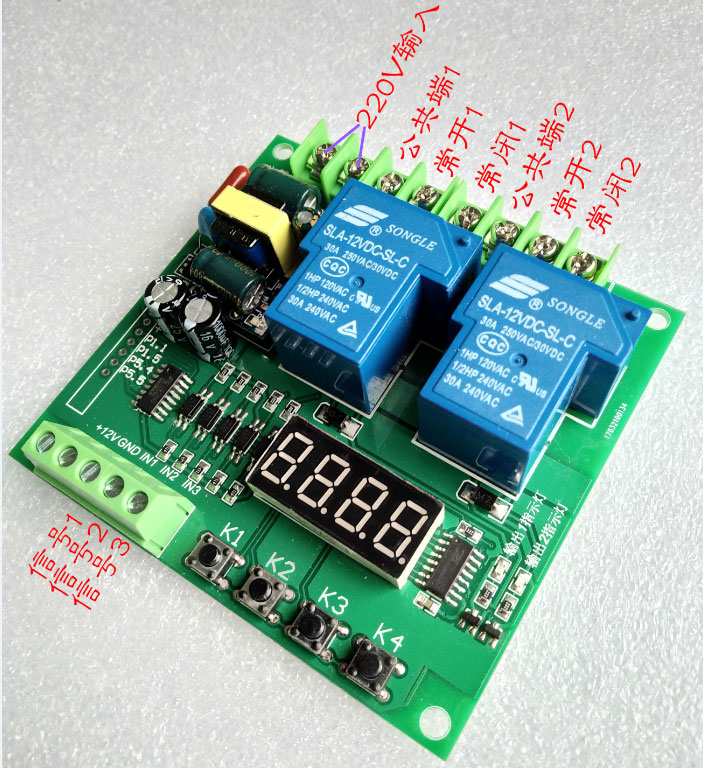6 common functions to meet more application requirements; can control 2-way solenoid valves, water pumps, motors, light strips, etc. to operate freely
Input voltage: AC 110V~250V
Output power: can control DC or AC loads within 30A
Time range: adjustable at any time from 0.1 second to 999 minutes
Wiring port description:
1. 220V AC: input power
3. IN1: signal input terminal 1 (negative trigger)
4. IN2: signal input terminal 2 (negative trigger)
2. IN3: signal input terminal 3 (negative trigger)
5. NO: The relay is normally open interface, the relay is suspended before the pull-in, and it is shorted with COM after the pull-in
6. COM: Relay public interface
7. NC: Relay normally closed interface, before the relay pulls in, it is shorted with COM, and after the pull-in, it is suspended
Function list:
P--1: Give signal 1, relay 1 pulls in and stops automatically at time A; gives signal 2, relay 2 pulls in and stops automatically at time B; signal 3 is emergency stop reset signal
P--2: Give signal 1, relay 1 pulls in and stops automatically at time A; relay 2 starts to delay B time from the start of the signal, and then pulls in and stops automatically at C time (the time unit of this function needs to be consistent)
P--3: After power on, relay 1 pulls in until time A releases, waits for time C, relay 2 pulls in until time B releases, waits for time C; relays 1 and 2 work in turn in an infinite cycle
(If you control the forward and reverse of the motor, it can be understood as: the energized motor rotates forward for a period of time; stops for a period of time; automatically reverses for a period of time; stops for a period of time; then automatically rotates forward; and so on)
P--4: Give signal 1, relay 1 pulls in; give signal 2 (limit), relay 1 stops and starts timing until A time relay 2 pulls in; gives signal 3 (limit), relay 2 stops and starts timing until B time relay 1 pulls in; infinite loop
(If you control the forward and reverse rotation of the motor, it can be understood as: press the start button 1; the motor forwards to the limit 2 and stops for a period of time; automatically reverses to the limit 3 and stops for a period of time; then automatically rotates forward; and so on)
P--5: Give signal 1, relay 1 pulls in; give signal 2 (limit), relay 1 stops and starts timing until A time relay 2 pulls in; give signal 3 (limit), relay 2 stops; give signal 1 again; execute again
(If you control the forward and reverse of the motor, it can be understood as: press the start button 1; the motor forwards to the limit 2 and stops for a period of time; automatically reverses to the limit 3 to stop; give signal 1 again; execute again)
P—6: Give signal 1, relay 1 pulls in; give signal 2 (limit), relay 1 stops; give signal 1 again, relay 2 pulls in; give signal 3 (limit), relay 2 stops;
(If you control the forward and reverse of the motor, it can be understood as: press the start button 1; forward to the limit 2 to stop; press the start button 1 again; reverse to the limit 3 to stop;)
If with remote control function: remote control A key and B key start the above function; C key press relay 1 to work (forward rotation); press relay 1 again to stop (stop); D key and press relay 2 to work (reverse); press relay 2 again to stop (stop);

Key setting instructions:
Power-on display "----" means entering the standby state;
Press K1 for the first time, the screen displays: P—1: K2 and K3 adjustment mode
Press K1 for the second time, the screen displays: A001: K2 and K3 adjust the first time A, K4 adjusts the decimal point (time unit)
Press K1 for the third time, the screen displays: B001: K2 and K3 adjust the second time B, K4 adjusts the decimal point (time unit)
Press K1 for the fourth time, the screen displays: C001: K2 and K3 adjust the third time C, K4 adjusts the decimal point (time unit)
Press K1 for the fifth time, display "———" means enter the standby state;
For example; need to set mode: P--2; time: A010 B005 C006:
Indicates the second working mode; after the signal 1 is given; the relay 1 is turned off after 10 seconds of starting; the relay 2 is delayed for 5 seconds after the signal is given again, and then it is turned off automatically for 1 second
Description of the decimal point time unit:
XX.X decimal point in ten, timing range: 0.1 seconds ~ 99.9 seconds
XXX has no decimal point, timing range: 1 second to 999 seconds
XXX. The decimal point is in ones place, timing range: 1 minute ~ 999 minutes
Contact: Adam
Phone: +86 18205991243
E-mail: sale1@rfid-life.com
Add: No.987,Innovation Park,Huli District,Xiamen,China